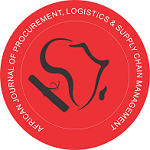Eric Ekow T. Ghansah
(MSc. CPMC, BSc. PSCM, HND PS)
Ghana Institute of Management & Public Administration (GIMPA)
Abstract
Procurement is vital to every industrialized institution because every now and then, such institutions buy the services of third party workers, goods or other services from suppliers which the Ghana Bauxite Company is not an exception. The aim of the study was to explore the perception of suppliers towards the procurement practices of Ghana Bauxite Company Limited with the following objectives; to identify the challenges faced by the suppliers in relation to the procurement practices of Ghana Bauxite Company, to identify the causes of challenges faced by the suppliers, to identify the factors for effective buyer-suppliers relationships. Though a thorough literature review question was designed and administered to respondents within the scope of study. Data collected was later analyzed using descriptive and mean score analysis of the Statistical Package for Social Scientist. The study revealed that, most supplier’s firms are owned by expatriate. Regulatory risk, operational risk, difficult for new entrant, lack of supplier development and high selection criteria of suppliers are the critical challenges faced by suppliers which are caused by Geographical location of mining sites, unreliability among suppliers, competitiveness among suppliers, delay in payment of certificates, limited technology and exorbitant rates by suppliers. In addition, the study revealed that, fairness, dependability on the side of suppliers, suppliers’ trustworthiness and suppliers’ commitment are highly recognized factors for effective buyer-supplier relationship. The study therefore recommended that, government should award firms adhering to its regulations, support suppliers through capacity building. GBCL should allow for local content during awarding of contract, provide supplier development management. Finally, proper organizational management system should be implemented by suppliers.
Keywords: Procurement, Relationship, Buyer, Supplier, Regulatory Risk, Operational Risk, Challenges, Selection Criteria.


